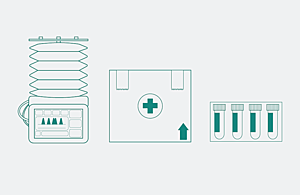Chancellor waives duties and VAT on vital medical imports
Chancellor waives import taxes on vital medical equipment including ventilators, coronavirus testing kits and protective clothing

- goods arriving from outside the EU will not be subject to customs duty or import VAT
- move will reduce red tape to ensure frontline health workers get vital equipment quickly and removes barriers to those who want to donate supplies to the NHS
The Chancellor has waived import taxes on medical equipment crucial to the fight against coronavirus – reducing red tape to ensure equipment gets to frontline health workers faster.
NHS suppliers will no longer have to pay customs duty and import VAT on specific medical goods coming from outside the EU, including ventilators, coronavirus testing kits and protective clothing.
The removal of the tariffs, which can be up to 12 per cent on the price of these goods, will mean more vital supplies are flowing into the UK to help the brave frontline workers treating patients with coronavirus.
Chancellor Rishi Sunak said:
We are taking decisive action to ensure our NHS has everything it needs to fight this outbreak.
Waiving import taxes on vital medical equipment such as ventilators will speed up and increase the supply of critical items going to our frontline health workers.
Dealing with coronavirus is a collective national effort and I will do everything I can to help us win this battle.
The changes, which were introduced last Friday, will also make the UK more attractive to companies who want to produce or donate supplies to fight coronavirus.
The move helps deliver on the Chancellor’s promise to do whatever extra resources the NHS needs to cope with the outbreak
The list of goods exempt from import taxes includes ventilators, COVID-19 testing kits, face masks, protective garments and eye protectors, amongst hundreds of other vital products to tackle the outbreak of coronavirus. The types of goods covered by the UK’s new duty-free rules was created by the Department of Health.
Health and Social Care Secretary Matt Hancock said:
We are working around the clock to ensure that our heroic frontline NHS and social care staff have all they need to tackle coronavirus.
The removal of import taxes for these goods will help clear the way for even more equipment to reach the frontline.
International Trade Secretary, Liz Truss said:
We are removing tariffs and barriers on essential medical supplies imported into the UK to ensure our front line workers have everything they need to treat people suffering from Covid-19.
As I agreed with my G20 trade minister counterparts this Monday, we will work together to keep trade flowing and ensure the supply of essential goods and services.
Notes
- Under the current rules, importers require a duty deferment account with HMRC backed by a guarantee. Importers of these critical goods would need to increase the level of their guarantee to cover any additional duty due.
- This new approach, in place until 31 July 2020, will allow companies to import goods critical for our fight against coronavirus at a faster rate and reduce costs significantly.
- The relief can be claimed from HMRC immediately by state organisations, including state bodies, public bodies and other bodies governed by public law who are supplying the NHS. Other approved organisations wanting to supply the NHS can also apply to HMRC
- HMRC has published new guidance about the import relief on GOV.UK. Only organisations supplying the NHS can utilise this relief.
- All imports will continue to arrive through the same channels and face the same checks as before, so there is minimal chance of fraud. Companies benefiting from the relief also need to first be approved by HMRC.
- The EU’s disaster relief regulation can be used in relation to COVID-19. This allows certain items that are needed to deal with C-19 to be imported free of VAT and customs duties.